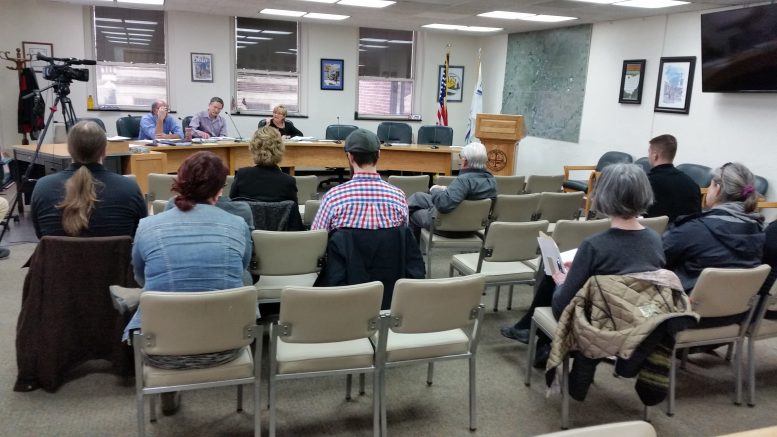By JAN LARSON McLAUGHLIN
BG Independent News
The idea of inviting transient food truck businesses into downtown Bowling Green leaves a bad taste for a stalwart member of the downtown business community.
Floyd Craft, owner of Ben Franklin, Ace Hardware and other downtown buildings, said existing downtown businesses pay taxes into a Special Improvement District that supports items such as street cleaning, flower planting and watering, snow cleanup, and weekend trash pickup. Craft pays the SID anywhere from $200 to $1,049 a year, depending on the property.
My main concern is the downtown,” Craft told the three council members – Bill Herald, Sandy Rowland and John Zanfardino – charged with coming up with regulations for food trucks.
“I’m very much against having outsiders in our downtown” – people who don’t pay property taxes and would only have to pay a relatively small permit fee, he said.
“We can barely cover our expenses as it is,” Craft said of the downtown district.
But Craft also noted that he was one of the people behind the start of the Black Swamp Arts Festival, which allows food trucks to set up in a city parking lot for a weekend. The fee charged for that is quite high, he added.
The discussion at the previous meetings on food trucks has focused on allowing the vendors downtown for special events – not on an ongoing basis.
Nadya Shihadeh, owner of Qdoba in the downtown, said parking is already a problem for downtown restaurants. However, if the city sets specific rules for the location and hours of operation, Shihadeh said she could get behind the idea.
“I think food trucks are cool, totally,” she said.
“I’m not against food trucks,” as long as they are regulated, Shihadeh said.
Garrett Jones, owner of Reverend’s, said the city needs to limit the number and the size of the food trucks.
“Some of these vendor trucks are massive,” and would take up too many valuable parking spots, he said.
Rather than focusing on the downtown, Jones suggested that the city look at the mall parking lot on the north edge of the city for food trucks, and maybe for the weekly farmers market.
“There’s not much going on there at all,” and the site could benefit from some revitalization, he said.
Jones also said he has spoken with some downtown Perrysburg restaurant owners who have seen their businesses hurt by food trucks at the weekly farmers market there.
Christopher Parratt, who said he worked in the restaurant business for 15 years, said the city needs to create a level playing field for brick and mortar restaurants and for food trucks.
From a patron perspective, city resident Ann Beck thanked the committee working to come up with a plan to allow food trucks.
“When I think of a progressive town, and a college town, I think of cool restaurants and pubs, and also food trucks,” Beck said. “We have a town full of millennials. I just think it’s a good idea.”
Rowland, who had been assigned to collect information from other communities with food trucks, brought a lot to the table Monday evening for the sixth public meeting on mobile food vendors. The goal, she said is to market the downtown and bring people from outside the city to the downtown.
“Food trucks are here and they are here to stay,” Rowland said of the national trend. According to the National League of Cities, food trucks generate $650 million in revenue annually. In the next five years, food trucks are expected to generate $2.7 billion in food revenues.
Rowland said she understands the concerns of brick and mortar restaurants.
“There’s a fear for restaurants that food vendors are invading their space,” she said. To ease those fears, some communities limit locations and times of operation.
Rowland researched the food truck regulations in college communities like Kent and Athens, and nearby communities like Perrysburg and Toledo.
She found the city ordinances varied greatly, with Perrysburg’s being two pages, and Kent’s being 23 pages long.
In all cases, the food trucks must pass health department inspections, fire inspections, must pay income tax, must comply with noise ordinances, must have at least $1 million in insurance coverage, and must pay a city fee. No community is allowed to restrict farm produce sales, Rowland said.
Athens and Kent have size restrictions on food trucks, while Perrysburg and Toledo do not.
Toledo and Perrysburg did not set limits of how close a food truck can set up to a brick and mortar restaurant. Athens, on the other hand, assigns its food trucks to certain locations year-round.
The city fees charged also vary with Perrysburg charging $100, Toledo $50, Kent $350 for city residents and $500 for non-residents, and Athens $1,500 to allow operation every day of the year.
The hours of operation vary, with Perrysburg having no restrictions, Athens allowing them from 7:30 a.m. to 3:30 a.m., and Kent allowing food trucks on Thursday, Friday and Saturday from 6 a.m. to 3 a.m.
The use of private and public space is also an issue, with Perrysburg and Toledo only allowing the food trucks on public space, Athens allowing on private property with city permits, and Kent allowing on private property or public sidewalks with the business’ permission.
The council committee will continue to hold meetings on the food truck issue, with the public encouraged to attend and voice opinions.





